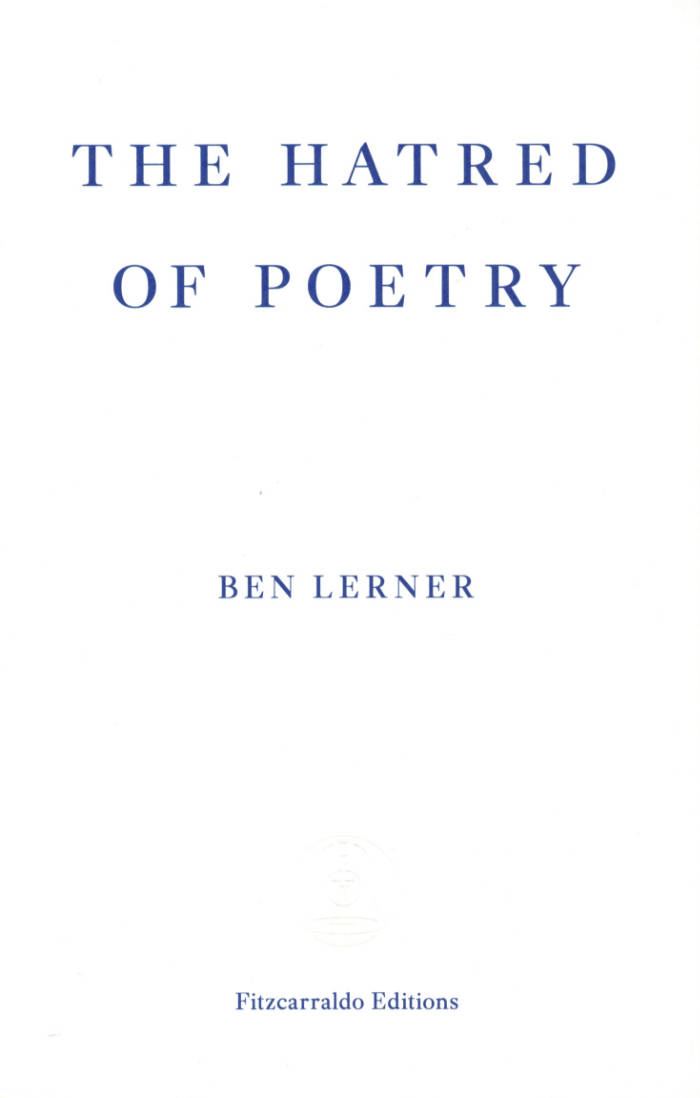Ben Lerner
Ben Lerner

The Hatred Of Poetry
No art has been denounced as often as poetry. It’s even bemoaned by poets: ‘I, too, dislike it,’ wrote Marianne Moore. ‘Many more people agree they hate poetry,’ Ben Lerner writes, ‘than can agree what poetry is. I, too, dislike it and have largely organized my life around it and do not experience that as a contradiction because poetry and the hatred of poetry are inextricable in ways it is my purpose to explore.’
In this inventive and lucid essay, Lerner takes the hatred of poetry as the starting point of his defence of the art. He examines poetry's greatest haters (beginning with Plato’s famous claim that an ideal city had no place for poets, who would only corrupt and mislead the young) and both its greatest and worst practitioners, providing inspired close readings of Keats, Dickinson, McGonagall, Whitman, and others. Throughout, he attempts to explain the noble failure at the heart of every truly great and truly horrible poem: the impulse to launch the experience of an individual into a timeless communal existence. In The Hatred of Poetry, Lerner has crafted an entertaining, personal, and entirely original examination of a vocation no less essential for being impossible.
And more

Fail Worse
It was the year that autofiction was everywhere.
All the major authors were accused of writing autofiction. You, the reader, were reading autofiction, maybe even writing autofiction yourself. The little known author HWK also was working towards his own autofiction, cycling through London, drafting, redrafting, scrapping, and scraping by, spiraling through his own mind, a geography of ambient anxiety, and a rising sea of associations and dead ends. As the tides begin to overwhelm him, HWK finds lifelines in the various stories that float past.
Possible rescuers, including Ben Lerner, Maggie Nelson, Sheila Heti, Mario Levrero, Jay Sherman (best known by his professional title, The Critic), and the noted animated therapist Dr. Katz call out to our narrator from the shores of literary and cultural success, will he reach them before the waters close over his head? Will HWK, dear reader, reach you?
Fail Worse is the smartest novel I’ve read in a long time, at once a scathing and hilarious critique of the limitations and conventions of autofiction as well as a moving work of personal narrative. I want to give copies of this novel to every writer I know. – Madeleine Watts, author of The Inland Sea
A brilliantly audacious and thoroughly ridiculous book – skewers its subject with a grandeur and wit it scarcely deserves… a stained glass window thrown at a pebble. – Keiran Goddard, author of I See Buildings Fall Like Lightning

Wave of Blood
Is it the computerization of the planet
Or a loosening of my fidelity to suffering
I don’t understand the intensity
I’ve hidden here but I know I despaired
Of finding a physical place to keep
My tears. Now what. Seas that go turquoise
When you stop looking at them . . .
Wrestling with the mind of war, at times shocking in its self-analysis, Wave of Blood is a furious and sincere essay, an eclipse notebook, a family chronicle, all told in the poetry of witness.
Praise for Ariana Reines:
Ariana Reines is a go-for-broke artist who honors her traditions by being like no one else. Some of us have made a fetish of our stupidity, pretending to forget history, and some of us have made a fetish of despair, congratulating ourselves on melancholia, but Ariana is too brilliant and too alive for either of those sad luxuries... I am convinced of the authenticity of the summonses she receives and the summonses she issues and when I read her I am reminded that all of this is a calling before it's an identity or career. Her voice-which is always more than hers alone is a dialectic between the very ancient and the bleeding edge. - Ben Lerner
Reines's books are works of intellectual commitment and structural sophistication; at the same time, they allow the raw stuff of being, in all its messiness, to enter the page. -The White Review
Mind-blowing. - Kim Gordon
Her writing is queer and raunchy, raw and occult, seemingly never pulling away from her deepest vulnerabilities. Yet Reines simultaneously maintains a feeling of epic poetry, of ancient intention. She moves between worlds in search of the divine and the self. - The New York Times
These are the kinds of poems that reorient you in the world, make you understand how little you know, but how much is inside you. - NYLON